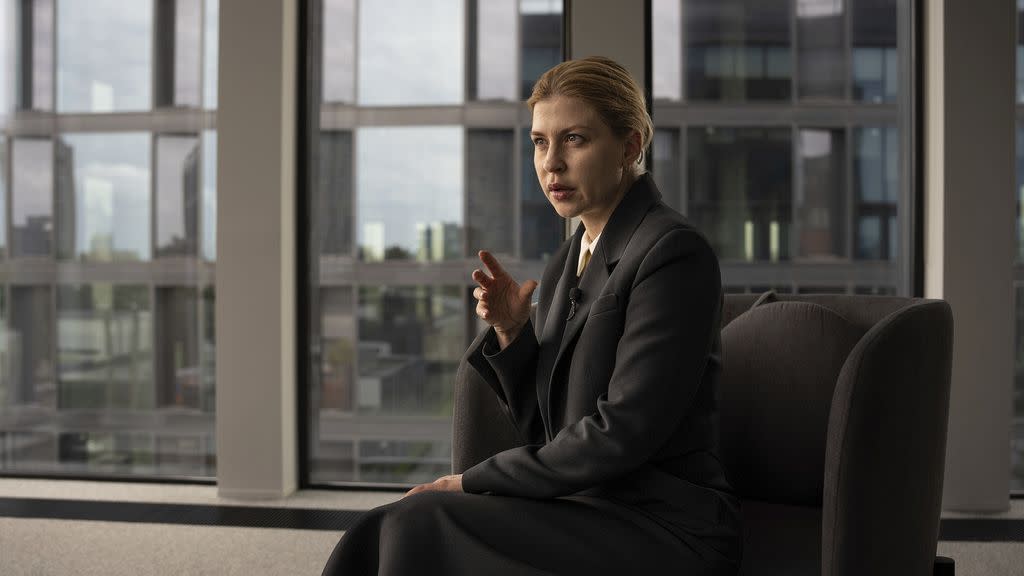Ukraine 'moving fast' on its EU membership path, delegation head says

The decision to launch accession talks this week is a “big day” for Ukraine, the deputy prime minister for European and Euro-Atlantic integration said.
“This is the utmost will of the Ukrainian people. And this is the irreversibility. And you’ve seen Ukrainians stand up for their choice,” Olga Stefanishyna stated in an interview in Kyiv on Sunday.
It was her first interview since being appointed chief negotiator for EU accession.
EU member countries agreed on Friday to start entry talks with Ukraine and Moldova – overcoming vocal opposition from Hungary, which takes over the EU’s rotating presidency on 1 July.
The process of joining varies for each country but could take years. Turkey started its accession talks almost two decades ago and is still waiting for full membership.
'Historic step'
Stefanishyna, who will head the opening of accession talks in Luxembourg on Tuesday, will be joined by several top government officials. Ukrainian President Volodymyr Zelenskyy is expected to give a speech at the launch ceremony, but Stefanishyna did not elaborate on whether he would do so in person or online.
Zelenskyy described Friday’s decision as a “historic step,” adding in an online post: “Generations of our people are realising their European dream." Ukraine is returning to Europe.
A survey of opinion polling by the European Parliament earlier this year suggested that EU citizens broadly back Ukraine’s membership bid but are less supportive of fast-tracking the process.
Ukraine, Stefanishyna said, was not seeking special treatment.
“Ukraine is moving fast,” she said, “without skipping any elements of the process (and) without asking (for) any discount.”
Russia has used economic pressure and, ultimately, military force to try and reverse the aspirations of its former Soviet neighbour to join Western alliances it regards as hostile.
Deadly protests a decade ago demanded that the government stick to a pledge to forge closer ties with the EU and put the country on a collision course with Russia.
“It’s a big day for everybody,” said Stefanishyna, who frequently showed emotion while describing the integration process. “It has been around two years since Ukraine applied for membership. The war is still raging on, but the accession is starting right now.”
Stefanishyna, a 38-year-old lawyer who has worked in civil service and government positions since her early twenties, will lead Ukraine’s 35-member delegation for negotiations with the EU.
Ukraine 'crazy and obsessed' with EU aspirations
In 2019, Ukraine changed its constitution to include those aspirations and formally applied to join the EU on 28 February 2022 – mere days after Russia launched its full-scale invasion.
Bordering EU members Poland, Slovakia, Hungary and Romania, Ukraine would overtake France to become the largest member of the bloc if it joined, shifting its centre of gravity further eastward.
Together with Moldova, it’s in a long line with other candidates – Albania, Bosnia and Herzegovina, Montenegro, North Macedonia, Serbia, Georgia and Turkey – some with membership aspirations spanning decades.
Ukraine is hoping to join by 2030.
While praised for making progress since its application, Ukraine must carry out dozens of institutional and legal reforms required for membership. The daunting list is led by steps to combat corruption and includes broad reforms to public administration, the judiciary, and market rules.
More than 1000 people in Ukraine are already involved in the accession process, which will take place without a summer break.
“The next half a year will be crucial for our key negotiators,” she said, adding that Ukraine needs to come up with a clear reform roadmap.
“The accession process and Ukraine’s membership is the top priority of our president,” she said. “Ukraine is a bit crazy and obsessed with the EU accession process.”


